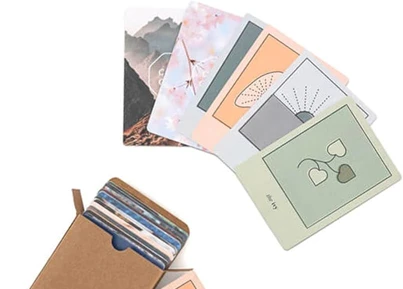In today’s fast-paced and often chaotic world, it’s not uncommon for many people to experience feelings of anxiety and stress. The constant pressure to meet deadlines, the demands of everyday life, and the uncertainties of the future can leave us feeling overwhelmed and out of balance. If you’re looking for a natural and holistic approach to finding peace and serenity, tarot cards could be the key. Tarot cards have been used for centuries as a tool for guidance, self-reflection, and personal growth. In this article, we will explore the impact of anxiety, how tarot cards can help alleviate it, the top tarot cards for calming anxiety, how to use tarot cards for this purpose, and additional tips for managing anxiety. So grab your tarot deck and get ready to embark on a journey of inner exploration and tranquility.
Contents
- The Impact of Anxiety
- How Tarot Cards Can Help
- Top Tarot Cards for Calming Anxiety
- How to Use Tarot Cards for Calming Anxiety
- Additional Tips for Managing Anxiety
- Conclusion
-
Frequently Asked Questions
- What is the origin of tarot cards?
- How do tarot cards work?
- Can tarot cards really help with anxiety?
- Do I need special abilities to read tarot cards?
- How do I choose a tarot deck?
- Can I use tarot cards for self-reflection without any specific question?
- How often should I use tarot cards for anxiety relief?
- Can tarot cards predict the future?
- Should I always follow the advice given by tarot cards?
- Can tarot cards replace professional help for managing anxiety?
- References
The Impact of Anxiety
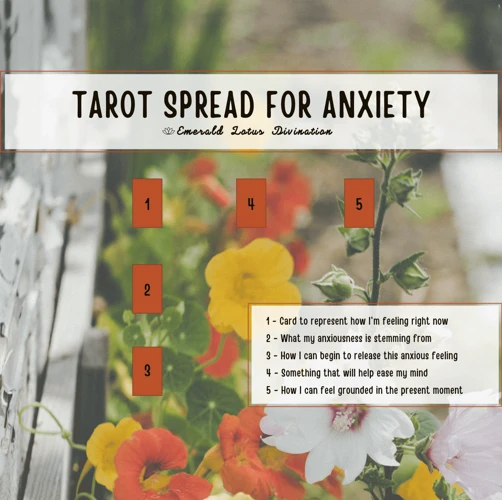
Anxiety can have a profound impact on our mental, emotional, and physical well-being. It is a natural response to stress, but when it becomes chronic or overwhelming, it can disrupt our daily lives and hinder our ability to find peace and serenity. Understanding anxiety requires recognizing its various forms, such as generalized anxiety disorder, social anxiety, or panic disorder. Each form presents its unique set of symptoms and triggers, making it crucial to identify and address them effectively. The effects of anxiety can be debilitating, affecting our sleep, appetite, concentration, and overall quality of life. It can manifest as racing thoughts, restlessness, irritability, and even physical symptoms like headaches or stomachaches. Managing anxiety is essential to regain control and restore balance. Work-related stress, personal relationships, financial worries, and other factors can contribute to anxiety levels. That’s where tarot cards can offer a powerful tool for finding solace and calm amidst the chaos.
Understanding Anxiety
When it comes to understanding anxiety, it’s important to recognize that it is more than just feeling stressed or worried. It is a complex and multifaceted condition that can affect individuals differently. Anxiety is often characterized by excessive and persistent fear, apprehension, and uncertainty. It can stem from a variety of factors, including genetics, brain chemistry, environmental stressors, and past traumatic experiences. While it is normal to experience occasional anxiety in response to certain situations, such as public speaking or job interviews, chronic anxiety can significantly impact one’s quality of life. It can lead to avoidance behaviors, social isolation, and difficulty engaging in daily activities. The symptoms of anxiety can manifest both physically and emotionally, including rapid heartbeat, shortness of breath, racing thoughts, restlessness, irritability, and difficulty concentrating. Understanding the underlying causes and triggers of anxiety is crucial in developing effective strategies for managing it. Tarot spreads and tarot cards can provide valuable insights into the root causes of anxiety and offer guidance on how to find peace and serenity. Through self-reflection, exploration, and the symbolism of the tarot, individuals can gain a deeper understanding of their anxiety and begin the journey towards healing and balance.
Effects of Anxiety
When anxiety takes hold, its effects can permeate every aspect of our lives. Mentally, anxiety can lead to racing thoughts, excessive worrying, and difficulty focusing or making decisions. It can also trigger feelings of fear, restlessness, and irritability, making it challenging to find peace of mind. Emotionally, anxiety can cause intense feelings of unease, dread, and a sense of impending doom. It can lead to a loss of self-confidence and self-esteem, making it difficult to engage in social interactions or pursue goals. Physically, anxiety can manifest as a range of symptoms, such as rapid heartbeat, shortness of breath, muscle tension, headaches, and gastrointestinal issues. These physical symptoms can further exacerbate the sense of unease and contribute to a vicious cycle of anxiety. Additionally, anxiety can affect our sleep patterns, leading to difficulties falling asleep or staying asleep, resulting in fatigue and reduced energy levels during the day. The effects of anxiety can be incredibly disruptive to both our daily lives and overall well-being. By addressing and managing anxiety, we can strive to find peace, balance, and serenity in our lives.
How Tarot Cards Can Help
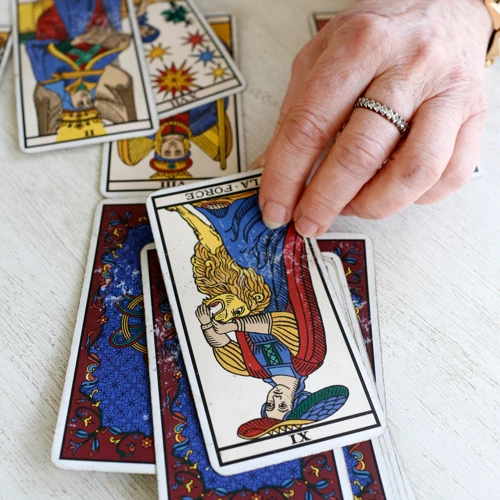
Tarot cards can be a valuable resource for finding peace and serenity in the midst of anxiety. Connecting with your inner self is a crucial step in managing anxiety, and tarot cards provide a medium to tap into your subconscious mind and gain insights into your emotions, fears, and desires. Through tarot readings, you can gain clarity and perspective on the challenges you’re facing, enabling you to view them from a different angle and find potential solutions or alternative paths. The symbolism and imagery on the cards can spark intuition and encourage positive thinking, helping you shift your mindset from a place of worry and negativity to one of hope and possibility. By focusing on the present moment and the guidance provided by the tarot, you can cultivate a sense of calmness and release stress. Tarot cards serve as a mirror to your inner self, offering wisdom, guidance, and support as you navigate through the challenges of anxiety.
Connecting with Your Inner Self
Connecting with your inner self is a fundamental aspect of using tarot cards to calm anxiety. It involves delving deep within yourself to explore your emotions, thoughts, desires, and fears. By connecting with your inner self through tarot, you can gain a better understanding of your anxiety triggers and the underlying emotions that contribute to your anxiety. This process allows you to acknowledge and accept these emotions, fostering a sense of self-awareness and compassion. Tarot cards serve as a tool for self-reflection and introspection, offering insights into your current state of mind and guiding you towards a more peaceful and centered mindset. Through the symbolism and imagery of the cards, you can tap into your intuition and uncover hidden aspects of yourself that may be contributing to your anxiety. It allows you to explore your inner landscape and engage in a dialogue with your subconscious mind. This connection with your inner self empowers you to take charge of your anxiety and make conscious choices that align with your true desires and values. Whether you pull a card that reflects your fears or one that represents inner strength, each card acts as a mirror, showing you aspects of yourself that are in need of attention and healing. By actively engaging with these messages and insights, you can nurture a deeper connection with your inner self and cultivate a sense of inner peace and serenity.
Gaining Clarity and Perspective
Gaining clarity and perspective is a crucial aspect of managing anxiety, and tarot cards can be an invaluable tool in this process. When we are anxious, our thoughts can become clouded and our judgment can be affected. Tarot cards enable us to tap into our subconscious mind and gain insights that we may not be aware of consciously. Through a tarot reading, we can explore the various facets of our situation and gain a fresh perspective on our challenges. The imagery and symbolism of the cards act as a mirror, reflecting back to us the hidden aspects of our thoughts and emotions. By providing us with a new lens through which to view our circumstances, tarot cards allow us to see beyond our immediate concerns and gain a broader understanding of the situation. This broader perspective can help us make more informed decisions and take actions that are aligned with our true desires and values. Tarot cards can also reveal patterns or recurring themes in our lives, helping us recognize any negative thought patterns or behaviors that may be contributing to our anxiety. Armed with this knowledge, we can work towards breaking free from these patterns and adopting healthier thought processes. The process of gaining clarity and perspective through tarot cards is highly personal, and each reading will provide unique insights tailored to the individual. It is important to approach the cards with an open mind and a willingness to explore the deeper layers of our psyche.
Encouraging Positive Thinking
Encouraging positive thinking is a fundamental aspect of using tarot cards for calming anxiety. When we are in a state of anxiety, our minds often gravitate towards negative thoughts and worst-case scenarios. Tarot cards can shift our focus towards a more positive and empowering mindset. By drawing cards that represent optimism, hope, and resilience, we can train our minds to see beyond the current challenges and envision a brighter future.
One tarot card that can greatly aid in encouraging positive thinking is The Sun. This card symbolizes joy, vitality, and success. Its presence in a tarot reading reminds us to embrace a positive outlook and approach life with enthusiasm. The Sun card serves as a reminder that even in the darkest times, there is always a glimmer of hope and a reason to be optimistic.
Another card that can uplift our spirits and promote positive thinking is The Ace of Cups. This card represents new beginnings, emotional fulfillment, and love. It encourages us to open our hearts and embrace the positive emotions that can bring us peace and serenity.
In addition to specific tarot cards, the act of engaging with tarot itself can be a powerful tool for promoting positive thinking. The process of shuffling and drawing cards allows us to focus our attention on what we desire and what we hope to achieve. It sparks our imagination and invites us to visualize a positive outcome. By actively participating in the tarot reading and reflecting on the messages that emerge, we cultivate a mindset that is receptive to positive possibilities.
It’s important to remember that tarot cards themselves do not have magical powers, but rather act as a tool for self-reflection and guidance. It is our interpretation and intention that give them meaning. By consciously seeking out cards that inspire positive thoughts and feelings, we can retrain our minds to embrace optimism and cultivate a more positive outlook on life.
Top Tarot Cards for Calming Anxiety
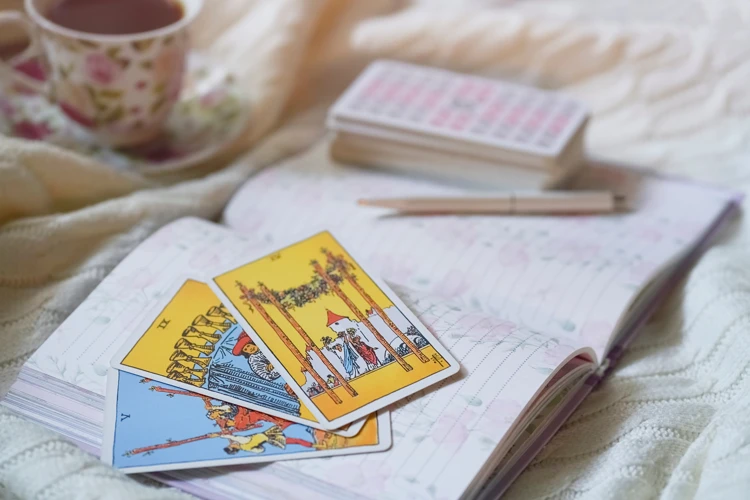
When it comes to using tarot cards for calming anxiety, certain cards have a particularly soothing and comforting energy. These cards can help us tap into our inner wisdom and guide us towards a state of peace and serenity. One of the top tarot cards for this purpose is The Empress. Representing nurturing and abundance, this card encourages us to connect with our nurturing side and embrace self-care. The Star is another powerful card for calming anxiety, symbolizing hope, inspiration, and healing. It reminds us that there is always light at the end of the tunnel, offering a sense of optimism and renewal. Temperance is a card that promotes balance and harmony, urging us to find moderation in our lives and restore equilibrium. The calming energy of The Moon card helps us navigate through our deepest fears and anxieties, providing insights and guidance along the way. Lastly, The Six of Cups signifies innocence, nostalgia, and emotional healing. This card invites us to find solace in our past experiences and allows us to embrace a sense of inner peace. Incorporating these tarot cards into your readings can greatly aid in calming anxiety and finding solace in turbulent times.
The Empress
The Empress card is a symbol of nurturing energy, abundance, and feminine power. In tarot, she represents the archetype of the mother figure and embodies qualities of love, compassion, and creativity. When it comes to calming anxiety, The Empress card can provide a sense of comfort and reassurance. This card encourages you to tap into your nurturing side and take care of yourself. It reminds you to prioritize self-care and find ways to nurture your mind, body, and spirit. The Empress card is a reminder that you have the inner strength and resources to overcome any challenges and find stability in your life. It invites you to connect with nature and find joy in the simple pleasures of life. When using The Empress card for calming anxiety, you can incorporate it into your meditation practice, visualize its energy surrounding you, or even create an altar with representations of abundance and growth. The Empress card reminds us that we are deserving of love, abundance, and peace, and it can serve as a powerful tool for finding serenity in our lives.
The Star
The Star tarot card is a symbol of hope, inspiration, and healing. When it comes to calming anxiety, The Star is particularly powerful in providing reassurance and reminding us that brighter days are ahead. In tarot decks, The Star is often depicted as a serene woman pouring water from a jug into a pool or river. This imagery represents the flow of positive energy and the renewal of hope. The Star encourages us to look beyond our current challenges and have faith in the universe’s ability to guide us. When The Star appears in a tarot reading related to anxiety, it signifies a period of healing and finding inner peace. It serves as a reminder to believe in ourselves and trust that the universe is working in our favor. The Star invites us to let go of fear and embrace a sense of optimism, knowing that we are supported on our journey. This card encourages us to focus on self-care and take steps towards nurturing our emotional well-being. By connecting with The Star’s energy, we can cultivate a sense of calm and serenity, allowing anxiety to dissipate and making way for a more balanced and harmonious life.
Temperance
Temperance is one of the most powerful and influential tarot cards when it comes to calming anxiety and finding inner balance. It is depicted as a figure pouring water between two cups, symbolizing the need for harmony and moderation. This card encourages us to find a middle ground and to find a sense of equilibrium in our lives. When dealing with anxiety, Temperance urges us to find patience, self-control, and moderation in our thoughts and actions. By embracing this card’s energy, we can learn to navigate our emotions with grace and find a sense of calm amidst the chaos. Temperance reminds us to avoid extremes and to find harmony in our thoughts, feelings, and behaviors. It teaches us the importance of being adaptable and finding a balance between work and rest, action and reflection. When facing anxiety, the Temperance card serves as a gentle reminder to take a step back, breathe, and find a harmonious flow within ourselves. Its calming energy can help us find stability, emotional healing, and a renewed sense of purpose. Whether drawn in a tarot reading or used as a visual meditation tool, Temperance can provide the guidance needed to find inner peace and tranquility.
The Moon
The Moon card is deeply rooted in symbolism and holds great significance when it comes to calming anxiety. When this card appears in a tarot reading, it invites us to delve into our subconscious and explore our deepest fears and emotions. This card represents the mysterious, hidden aspects of ourselves that often contribute to anxiety. It encourages us to confront our fears head-on and gain a better understanding of the root causes behind our anxiety. The Moon card reminds us that our anxieties are often based on illusions and distorted perceptions. It urges us to trust our intuition and inner wisdom, guiding us toward clarity and peace. This card also emphasizes the importance of embracing the cyclical nature of life. Just as the moon goes through phases, so do our emotions and experiences. By recognizing that anxiety is a temporary state, we can find solace in knowing that brighter days will come. The Moon card serves as a reminder to embrace the darkness and uncertainty, as they are essential parts of our personal growth journey. It encourages us to surrender to the ebb and flow of life and to trust in the process. When using tarot cards for calming anxiety, drawing The Moon card can be a powerful opportunity for self-reflection, acceptance, and finding inner peace.
The Six of Cups
The Six of Cups is a tarot card that holds a deep sense of nostalgia and emotional connection. Depicted in the card are two children, one offering a cup filled with flowers to the other. This card symbolizes innocence, purity, and the joy of childhood. When it comes to calming anxiety, the Six of Cups can have a profound impact. It reminds us to tap into our inner child-like nature, seeking simplicity and delight in the present moment. By embracing the qualities of the Six of Cups, we can find solace and peace in the midst of our anxieties. It encourages us to cultivate gratitude and find comfort in happy memories. Reflecting on joyful experiences from our past can shift our focus away from worry and towards feelings of warmth and contentment. The Six of Cups also serves as a reminder to nurture our relationships and foster emotional connections. Reaching out to loved ones or engaging in acts of kindness can provide a sense of support and comfort during challenging times. Incorporating the energy of the Six of Cups into our lives can help us create a space of tranquility and bring about a sense of peace and serenity.
How to Use Tarot Cards for Calming Anxiety
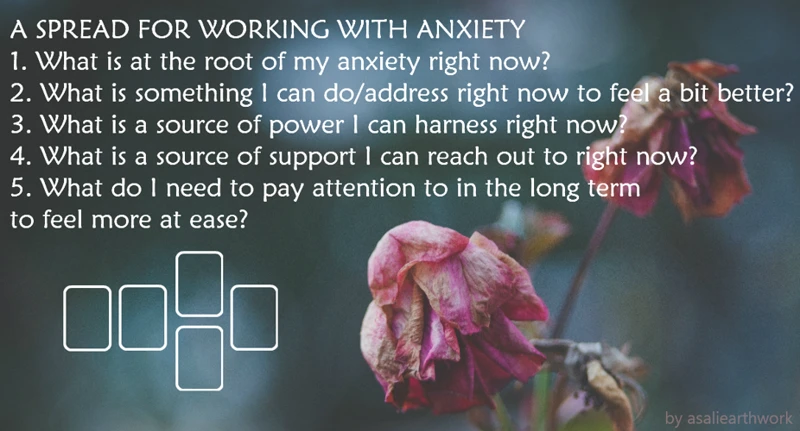
Using tarot cards for calming anxiety can be a transformative practice that allows you to tap into your inner wisdom and find peace. Here’s a step-by-step guide on how to use tarot cards for this purpose:
- Setting the Intention: Before you begin your tarot reading, take a moment to set your intention. Clearly define what you hope to gain from the reading, such as finding clarity, gaining insight, or finding calmness.
- Shuffling and Drawing the Cards: Shuffle the deck while focusing on your intention. When you feel ready, draw a card from the deck. Trust your intuition as you select a card that resonates with you.
- Interpreting the Messages: Each tarot card carries its unique symbolism and meaning. Take a moment to observe the imagery, colors, and emotions evoked by the card. Reflect on how it relates to your current state of anxiety and what message it may be offering. Journaling your thoughts and feelings can be beneficial.
By engaging in this process, you can gain valuable insights, identify patterns, and develop a deeper understanding of your anxiety. Remember to approach the tarot cards with an open mind and trust in the guidance they provide. Embrace the journey of self-reflection and self-discovery that tarot cards offer, and allow them to be a powerful tool in finding peace and serenity.
Setting the Intention
Setting the intention is a crucial step when using tarot cards for calming anxiety. This step helps to create a focused and purposeful mindset before engaging with the cards. Begin by finding a quiet and comfortable space where you can relax and concentrate. Take a few deep breaths to center yourself and clear your mind. As you do so, focus on your intention of seeking peace and serenity. This could involve letting go of anxious thoughts, finding clarity, or gaining insight into the root causes of your anxiety. Visualize yourself feeling calm and at ease. You may also choose to state your intention out loud or write it down on a piece of paper. This helps to solidify your commitment to the process and acts as a gentle reminder throughout the tarot reading. By setting a clear intention, you are directing your energy and attention toward a specific outcome, enhancing the effectiveness of the tarot cards in addressing your anxiety. Remember that intention setting is a personal practice, and it is important to honor your unique desires and needs during this process.
Shuffling and Drawing the Cards
is an essential step in using tarot cards for calming anxiety. The process begins with thoroughly shuffling the deck, allowing the energy to flow and mix within the cards. You can shuffle the cards by splitting the deck into two halves and riffling them together, or by simply mixing them thoroughly by hand. This action helps to clear your mind and focus your intentions on finding peace and serenity.
Once the cards are shuffled, take a moment to center yourself and connect with your inner self. Close your eyes, take a deep breath, and visualize a calming and soothing energy surrounding you. When you feel ready, you can start drawing the cards.
There are several ways to draw the cards, depending on your preferences and the specific tarot spread you’re working with. One common method is the three-card spread, where you draw three cards to provide insight into the past, present, and future. Another option is the Celtic Cross spread, which involves drawing ten cards to provide a comprehensive view of the situation at hand. You can also create your own unique spread or adapt existing spreads to suit your needs.
As you draw each card, pay attention to your intuition and any immediate impressions or emotions that arise. Trust your inner guidance and allow the cards to speak to you. Remember that there is no right or wrong way to interpret the cards. The meanings are fluid and can vary based on your personal experiences and the context of your specific situation.
Once you have drawn the cards, arrange them in the desired spread pattern and begin interpreting their meanings. The symbolism, imagery, and messages within each card can offer valuable insights and guidance for finding peace and serenity in the face of anxiety. Take your time to reflect on each card individually and consider how they relate to one another as a whole.
Whether you choose to journal about your interpretations, meditate on the cards, or seek additional resources to deepen your understanding, the process of shuffling and drawing the cards is a powerful way to engage with tarot for calming anxiety. Embrace the journey and trust that the wisdom of the cards will guide you towards inner peace and serenity.
Interpreting the Messages
Interpreting the messages from tarot cards is a crucial step in using them for calming anxiety. Once you have shuffled and drawn your cards, it’s time to delve into their meaning and symbolism. Here are some steps to help you effectively interpret the messages:
1. Trust your intuition: Tarot cards are a powerful tool for tapping into your inner wisdom. Allow your intuition to guide you as you explore the images, symbols, and feelings invoked by the cards.
2. Observe the visuals: Take a close look at the artwork and symbolism on each card. Notice the colors, objects, and figures depicted. Consider what they might represent in relation to your current state of mind and the question or concern you have.
3. Read the card meanings: Tarot decks often come with guidebooks or resources that provide interpretations for each card. Use them as a reference, but remember that your own interpretation and intuition are equally important. The meanings may vary depending on the deck you’re using and the specific spread or position of the cards.
4. Consider the card’s position: If you’re using a spread, each card’s position within the spread can offer additional insights. For example, a card in the past position may represent past influences or experiences, while a card in the future position may symbolize potential outcomes or opportunities.
5. Reflect on personal associations: Certain cards may trigger personal memories, emotions, or experiences. Pay attention to these associations as they can provide valuable insights into your current situation and offer guidance for finding peace and serenity.
6. Look for patterns and connections: As you interpret the messages of each card, look for patterns, similarities, or connections between them. This can provide a deeper understanding of the overall message or theme that is emerging from the reading.
Remember that tarot interpretations are subjective, and what matters most is the meaning that resonates with you personally. Trust yourself and your own intuition to interpret the messages in a way that serves your journey towards calming anxiety and finding inner peace.
Additional Tips for Managing Anxiety
In addition to using tarot cards for calming anxiety, there are several other effective strategies that can help in managing and reducing anxious feelings. Meditation and deep breathing exercises are powerful techniques that can promote relaxation and alleviate stress. Taking a few minutes each day to sit quietly, focus on your breath, and let go of racing thoughts can have a significant impact on your overall well-being. Journaling and self-reflection can also be beneficial in managing anxiety. By putting your thoughts and emotions down on paper, you can gain clarity, process your feelings, and identify patterns or triggers. Writing can provide a sense of release and help you gain a new perspective on your anxieties. Seeking professional help is another important step in managing anxiety. Therapy, counseling, or guidance from a mental health professional can offer support, coping strategies, and tools to navigate anxiety in a healthy way. Remember that everyone’s journey with anxiety is unique, and it may take time to find the techniques and approaches that work best for you.
Meditation and Deep Breathing
Meditation and deep breathing techniques are powerful tools for managing anxiety and promoting overall well-being. Meditation allows you to quiet the mind, reduce racing thoughts, and cultivate a sense of inner calm. Find a quiet and comfortable space where you can sit or lie down. Close your eyes and focus on your breath. Take slow, deep breaths, inhaling through your nose and exhaling through your mouth. As thoughts arise, gently acknowledge them and let them go, returning your attention to the breath. You can also incorporate guided meditation by listening to soothing audio recordings or using meditation apps. Deep breathing exercises, on the other hand, help to activate the body’s relaxation response and reduce stress. Practice diaphragmatic breathing by placing one hand on your belly and the other on your chest. Take a slow, deep breath in through your nose, allowing your belly to rise. Exhale slowly through your mouth, letting your belly sink. Repeat this deep breathing pattern several times, focusing on the sensation of relaxation with each breath. Both meditation and deep breathing can be practiced regularly to calm the mind, reduce anxiety, and promote a sense of peace and serenity in your life.
Journaling and Self-reflection
Journaling and self-reflection are valuable practices that can aid in managing anxiety and finding inner peace. Journaling is the act of writing down thoughts, feelings, and experiences in a personal journal or notebook. It is a cathartic process that allows us to express ourselves freely and without judgment. By putting our worries, fears, and frustrations onto paper, we can gain a sense of release and clarity. The act of writing also helps to organize our thoughts and emotions, making them more tangible and easier to process. Additionally, journaling can serve as a tool for self-reflection. Self-reflection involves taking a deeper look within ourselves and examining our thoughts, beliefs, and patterns of behavior. It allows us to gain insight into the root causes of our anxiety and understand how we can address them effectively. Through self-reflection, we can identify any negative thought patterns or limiting beliefs that contribute to our anxiety and work on replacing them with more positive and empowering ones. Journaling and self-reflection go hand in hand, as the act of journaling provides a safe space for self-reflection to take place. By regularly engaging in these practices, we can gain a better understanding of ourselves, our triggers, and our coping mechanisms. It also allows us to track our progress and celebrate our victories along the way. Whether it’s writing down our worries, exploring our emotions, or simply documenting our journey, journaling and self-reflection can be powerful tools for calming anxiety and finding inner peace.
Seeking Professional Help
When anxiety becomes overwhelming and starts to interfere with your daily life, it may be time to seek professional help. Mental health professionals, such as therapists or counselors, can provide valuable support and guidance in managing anxiety. Here are a few reasons why seeking professional help is important:
1. Expertise and Experience: Mental health professionals have extensive training and experience in treating anxiety disorders. They can provide an accurate diagnosis, develop a personalized treatment plan, and offer evidence-based strategies for managing anxiety symptoms.
2. Safe and Non-Judgmental Space: Therapy offers a safe and non-judgmental environment for individuals to express their concerns, fears, and worries. It allows you to explore the underlying causes of your anxiety and work through them with the help of a trained professional.
3. Cognitive Behavioral Therapy (CBT): CBT is a widely used therapeutic approach for anxiety treatment. A therapist can teach you techniques and coping mechanisms to reframe negative thoughts, challenge irrational beliefs, and develop healthier behaviors. This can help you gain a better understanding of your anxiety triggers and learn effective strategies for managing them.
4. Medication Management: In some cases, medication may be helpful in managing severe anxiety symptoms. A mental health professional can assess your situation and determine if medication is appropriate for you. They can also monitor your progress and make any necessary adjustments to your medication regimen.
5. Support and Accountability: Seeking professional help provides ongoing support and accountability throughout your journey towards managing anxiety. A therapist can help you set realistic goals, track your progress, and provide guidance during challenging times.
Remember, seeking professional help is not a sign of weakness but rather a proactive step towards taking care of your mental health. It’s essential to find a therapist or counselor who is a good fit for you and with whom you feel comfortable sharing your thoughts and emotions. Don’t hesitate to reach out and ask for help when needed.
| Reasons to Seek Professional Help for Anxiety |
|---|
| 1. Expertise and Experience |
| 2. Safe and Non-Judgmental Space |
| 3. Cognitive Behavioral Therapy (CBT) |
| 4. Medication Management |
| 5. Support and Accountability |
Conclusion
In conclusion, tarot cards can be a valuable tool for finding peace and serenity in the face of anxiety. By connecting with our inner selves, gaining clarity and perspective, and encouraging positive thinking, tarot cards offer a unique and holistic approach to managing anxiety. The top tarot cards for calming anxiety, such as The Empress, The Star, Temperance, The Moon, and The Six of Cups, provide guidance and insights that can help us navigate through challenging times. By setting intentions, shuffling and drawing the cards, and interpreting the messages, we can unlock the wisdom and guidance that tarot cards have to offer. Additionally, incorporating practices like meditation and deep breathing, journaling and self-reflection, and seeking professional help can complement the use of tarot cards in managing anxiety. It’s important to remember that everyone’s journey is unique, and what works for one person may not work for another. It may take time and experimentation to find the techniques and tools that resonate with you. Embrace the process and approach it with an open mind and heart. So, if you’re seeking peace, serenity, and a greater sense of calm, consider incorporating tarot cards into your self-care routine. Let the wisdom of the cards guide you towards finding inner peace and navigating the challenges of anxiety with grace and confidence.
Frequently Asked Questions
What is the origin of tarot cards?
Tarot cards originated in the 15th century in Europe. They were initially used for playing card games but eventually became popular as a tool for divination and spiritual guidance.
How do tarot cards work?
Tarot cards work by tapping into the subconscious mind and the collective unconscious. They serve as a mirror that reflects our thoughts, emotions, and experiences, allowing us to gain insights and guidance from within.
Can tarot cards really help with anxiety?
Yes, tarot cards can be a valuable tool for managing anxiety. They provide a means for self-reflection, gaining clarity, and shifting our perspective. Tarot readings can offer guidance and support during challenging times, helping to calm the mind and find peace.
Do I need special abilities to read tarot cards?
No, you don’t need special abilities to read tarot cards. Anyone can learn to interpret the cards with practice and an open mind. The more you work with the cards, the more your intuition and connection to them will develop.
How do I choose a tarot deck?
Choosing a tarot deck is a personal preference. Look for a deck that resonates with you visually and spiritually. Pay attention to the artwork, symbolism, and energy of the cards. It’s important to feel a connection and be inspired by the deck you choose.
Can I use tarot cards for self-reflection without any specific question?
Absolutely! Tarot cards can be used for general self-reflection without a specific question. Simply draw a card or a few cards and allow their message and symbolism to guide your contemplation. Trust your intuition and let the cards speak to you.
How often should I use tarot cards for anxiety relief?
There’s no set frequency for using tarot cards for anxiety relief. It depends on your personal needs and preferences. Some people find value in daily card pulls for guidance and inspiration, while others may choose to use them on an as-needed basis during stressful situations.
Can tarot cards predict the future?
Tarot cards are not meant to predict the future with absolute certainty. They are tools that offer insights, possibilities, and guidance based on the present moment. The future is not set in stone and can be influenced by our choices and actions.
Should I always follow the advice given by tarot cards?
The advice given by tarot cards should be taken into consideration, but ultimately, it’s up to you to decide how to apply it to your life. Trust your own judgment and intuition when interpreting the messages from the cards.
Can tarot cards replace professional help for managing anxiety?
Tarot cards can be a valuable complement to professional help for managing anxiety, but they shouldn’t replace it. If you’re experiencing severe anxiety or mental health issues, it’s important to seek the guidance of a qualified therapist or healthcare professional.
